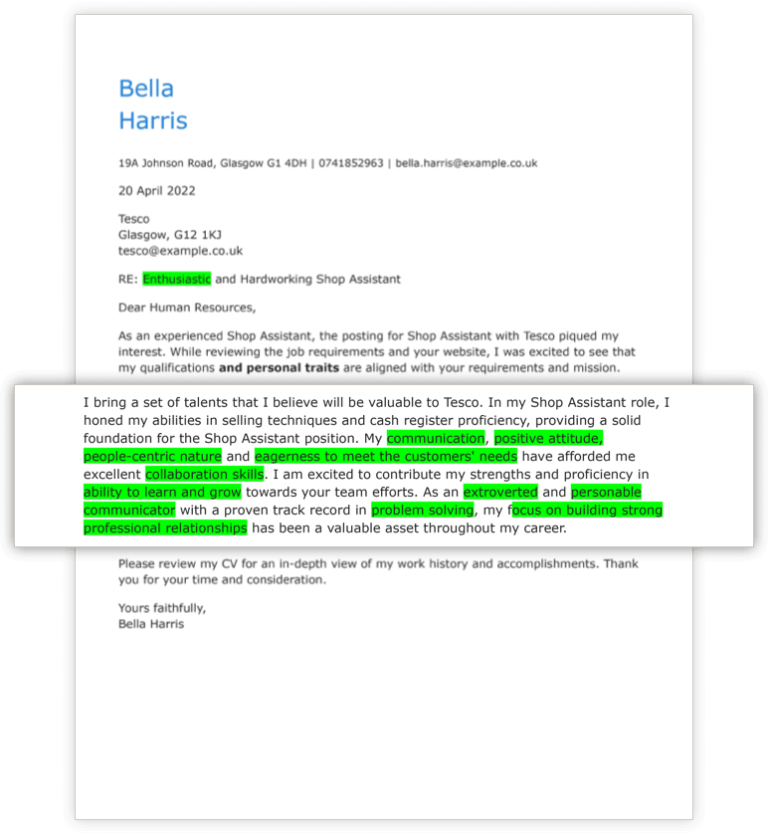Interpersonal Skills: Why They Matter
Interpersonal skills are the abilities you use to interact with others in the workplace and beyond. These skills include communication, empathy, teamwork, and conflict resolution, and they are vital for your CV.

Our customers have been hired by: *Foot Note
Your skills are the cornerstone of any successful job application. You’ll need to highlight them on your CV and back them up in your interview. Interpersonal skills are essential in nearly every role, as they’re all about connecting with people, communicating, and collaborating. Without strong interpersonal skills, it would be difficult to work effectively with others, manage tasks, or maintain a productive environment. Simply put, they’re the glue that holds everything together!
What is an interpersonal skill?
Interpersonal skills, also known as people skills, are the abilities that help you interact, communicate, and build relationships with others. Whether it’s chatting with a colleague, leading a team, or negotiating with clients, these skills are essential for navigating all social aspects of work.
Interpersonal skills include everything from active listening and conflict resolution to teamwork and empathy. In the workplace, they can make all the difference in creating a positive and productive environment. That’s why recruiters seek out candidates with good interpersonal skills.
Need help identifying your skills?
Our CV builder can automatically generate the right interpersonal skills based on your job title.
Why are interpersonal skills important?
A person with strong interpersonal skills can seamlessly integrate into a team, making others feel comfortable and valued. This leads to smoother interactions and better collaboration, helping you to work more efficiently. After all, would you prefer to work with a friendly, professional colleague who knows when to be serious and when to lighten the mood, or someone who’s distant and takes everything personally?
A positive workplace atmosphere is largely shaped by the individuals within it, and strong interpersonal skills are key to cultivating that environment. Effective communication, empathy, and the ability to resolve conflicts help improve morale, build trust, and foster a culture of collaboration. The better the interpersonal skills, the stronger the team dynamics, ultimately promoting growth and success for everyone involved.
These skills are also essential during the job application process. Your CV and cover letter are the first place to showcase your communication, problem-solving, and persuasion skills. Once you’re in the interview, it’s your opportunity to demonstrate these skills in real-time through body language, building rapport, and providing thoughtful answers to common interview questions. Whether applying for a new role or working within your current team, interpersonal skills are vital to professional success.
Having the right organisational skills on your CV is especially important when passing through applicant tracking systems (ATS). Many ATS are designed to scan CVs for relevant keywords.
Interpersonal skills examples to include on your CV
Here are some good examples of interpersonal skills you can add to your CV.Communication skills
Team management
Problem and conflict solving
An umbrella term for a combination of soft skills to help ease tension between two or more parties. The process of problem-solving consists of listening, analysis and decision.
Decision-making
Teamwork
Assertiveness
Persuasion
Networking
Negotiation
Empathy
Responsibility
Body language
Handling criticism
Giving feedback
How to showcase interpersonal skills on your CV
Step 1:
Include a dedicated interpersonal skills section
Ensure your CV includes a section dedicated to showcasing your skills. This should feature a clear list of 6-10 key skills that represent your strengths. Along with technical abilities, you should highlight your interpersonal skills, such as communication, teamwork, empathy, and conflict resolution. These qualities are vital in almost every job, so be sure to include any relevant examples, particularly those that reflect your ability to connect with colleagues and clients alike.
Step 2:
Provide evidence of your interpersonal skills in your work experience
Simply listing your interpersonal skills isn’t enough; you need to back them up with examples. In your work experience section, highlight specific instances where your people skills played a key role in achieving success. For example, rather than just stating you’re a "good communicator," you might say, "Facilitated weekly team meetings, fostering open communication and improving collaboration, resulting in a 15% increase in team productivity". This shows how you actively use your interpersonal skills to make an impact.
Step 3:
Mention your interpersonal skills in your personal statement
Your personal statement is your chance to make a strong first impression, so it’s worth mentioning your interpersonal skills early on. Use this section to briefly highlight your ability to work well with others, build relationships, and resolve issues. If these skills are particularly relevant to the role, consider providing a specific example. For instance, for a customer-facing role, you might say, "Experienced in building rapport with clients, ensuring high satisfaction levels and repeat business." This helps recruiters quickly understand the value you bring to the table.
Interpersonal skills CV examples
Below, we’ve provided two CV examples showcasing how to effectively include some interpersonal skills in the skills section of a CV. Take a look at how these skills are incorporated to create a well-rounded CV.
Interpersonal skills on CV - case study
Skills
- Skilled negotiator
- Self-motivated
- Organised and detail-orientated
- Strong analytival skills
- Project managment
- Budget management
- Strategic planning
In the CV above for a purchasing manager, you can see the following interpersonal skills highlighted: Skilled negotiator, self-motivated, and organised & detail-oriented. These are important to mention because:
- Skilled negotiator: Purchasing managers need to negotiate favourable terms with suppliers to secure cost-effective deals. This skill ensures they can drive down costs while maintaining strong relationships with vendors, which is crucial for budget management.
- Self-motivated: The role often requires managing multiple tasks and tight deadlines without constant supervision. Being self-motivated allows a purchasing manager to take the initiative, stay on top of tasks, and ensure the smooth running of procurement operations.
- Organised & detail-oriented: Effective organisation and attention to detail are essential for handling complex purchase orders, tracking deliveries, and maintaining accurate inventory records. These skills help prevent errors and delays, ensuring the procurement process runs efficiently.
Skills
- Massage therapy
- Aroma therapy
- Holistic therapies
- Reflexology
- Face and body therapies
- Excellent customer care
- Cross-selling strategies
- Excellent communication
- Positive work ethic
In the CV above for a spa therapist position, you can see the following interpersonal skills highlighted: Excellent customer care, good communication, and positive work ethic. These are important to mention because:
- Excellent customer care: As a spa therapist, providing exceptional customer service ensures client satisfaction and repeat business. This skill shows the therapist’s ability to make clients feel comfortable, relaxed, and valued during their treatments.
- Good communication: Spa therapists must communicate effectively with clients to understand their needs and explain treatment options. Good communication also helps with other staff members to ensure smooth operations and a pleasant environment for clients.
- Positive work ethic: A positive work ethic is key in the spa industry, where therapists are expected to maintain high standards of service and professionalism, even during busy periods.
Cover letter interpersonal skills
A cover letter is a document that accompanies your CV when applying for a job. It’s your chance to introduce yourself, express your interest in the role, and highlight why you’re the perfect fit for the position. While your CV lists your qualifications and experience, your cover letter provides a more personal touch and allows you to demonstrate your enthusiasm for the role.
When it comes to interpersonal skills, your cover letter is an excellent place to showcase how your ability to work with others can add value to the team. Highlighting skills such as communication, teamwork, and conflict resolution helps employers see that you’re capable of performing the technical aspects of the job but can also thrive in a collaborative and dynamic environment.
Cover letter example

In the example cover letter above for a shop assistant role, you can see a range of important interpersonal skills highlighted throughout. The letter naturally incorporates their skills such as communication, being people-centred, being extroverted, and the ability to learn and grow, just to name a few. These skills are essential in a customer-facing role, as they demonstrate the candidate’s ability to interact with customers, work within a team, and adapt in a fast-paced environment.
By showcasing these skills within the cover letter, the candidate demonstrates to the employer that they possess the right blend of personal qualities and practical experience, making them a strong contender for the role. Employers highly value these interpersonal skills as they create a positive store environment, ensure high customer satisfaction, and support team success. Including them in the cover letter strengthens the job application and sets the candidate apart from others who may focus solely on their work experience.
FAQs about CV interpersonal skills
What are interpersonal skills?
How do I highlight interpersonal skills on my CV?
Are interpersonal skills important for all jobs?
Can I mention interpersonal skills in my cover letter?
Should I include interpersonal skills even if they are not listed in the job description?
How can I improve my interpersonal skills for my CV?
Are interpersonal skills more important than technical skills on my CV?
Create your CV today
Ready to take the next step in your career? Your CV is your opportunity to highlight the skills, experience, and qualifications that set you apart. With our easy-to-use CV builder, you can quickly create a professional CV that showcases your unique abilities. Download your new CV and apply for your next opportunity in just a few clicks.

Andrew Smith
Senior Content Writer
Meet Andrew Smith – an accomplished English copywriter with a strong background in SEO optimisation. Passionate about producing engaging content, Andrew has written across various fields, including health and fitness, security, travel, and tourism.
*The names and logos of the companies referred to above are all trademarks of their respective holders. Unless specifically stated otherwise, such references are not intended to imply any affiliation or association with myperfectCV.











